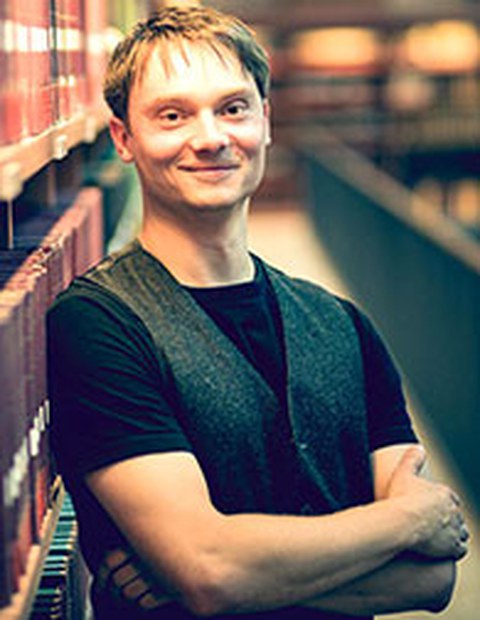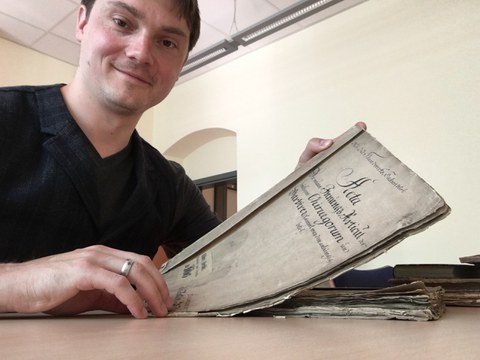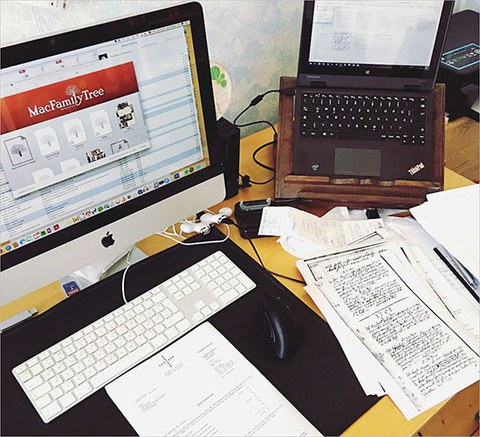"People focus on family history on holidays and in times of crisis"
(Interviewed in 2021)
Dagmar Möbius
Lars Thiele was planning a professional career in museums. But after earning a degree in history and German studies at TUD and gaining wide-ranging practical experience, he discovered his true calling. He is now a professional genealogist who helps people uncover their roots. The 38-year-old "Archivbegleiter" – or "archive supervisor" – is also commissioned to undertake extraordinary historical research.
"There was no one initial spark," says Lars Thiele. He had always been interested in history, read a lot and took advanced history in high school. Working in museums was his long-term goal. From 2002 to 2008, he studied for a Magister degree in modern and contemporary history, the history of Saxony, the history of technology, and German linguistics at TU Dresden. He also completed the certificate course "Intellectual Property Rights II | Copyright, Media & Internet Law" at the Faculty of Law.

Lars Thiele
"I wanted to learn how information about our past can be interpreted and how history is written," Thiele says, explaining his choice of subject. He was accepted by both Leipzig and Dresden. TU Dresden won out because of the campus, the program on offer, the fact that his then-girlfriend was studying there, and its proximity to friends and family, as he grew up in Dohna – the next town over. Thiele would have preferred to study contemporary history only. In retrospect, however, he thinks it was a good thing that the study regulations did not allow this, in part because he discovered language.
Although, the grammar courses in medieval studies were challenging, to say the least. "But they were an integral part of the subject and broadened my horizons. Three semesters of Latin didn't hurt either. They gave me an introduction to Romance languages."
Context is more important than facts
Thiele was expecting to learn the tools of knowledge acquisition, and he was not disappointed, thanks to good professors who both taught and questioned. Including Professor Gert Melville, whose lectures always went by far too quickly. "Although the Middle Ages are not my thing at all," Lars Thiele admits. Professor Gerd Schwerhoff taught fascinating classes on historical literature on crime. "And then there was Professor Thomas Hänseroth. A true Meißen man, likeable and down-to-earth; he had a great personality." The professor of the history of technology and engineering inspired Thiele's interest in the subject. More than modern history – "from the 18th century to a minute ago" – Lars Thiele was interested in the 20th century, including the National Socialist system and GDR history. "We had already covered it in school, but there were things I had trouble understanding then." It was at university that he realized that context and connections are more important than facts and figures. And that "there is no one truth, but rather different perspectives and interpretations." During the course of his degree, Lars Thiele transcribed lists of floods from the 18th century, attended seminars in Rome, and conducted field research with schoolchildren. "You just had to find the interesting topics yourself." Students had to organize a lot themselves in the Magister degree program.
Speaking to an audience
A practical session with Dr. Norbert Haase, former director of the Saxon Memorial Foundation, sparked Lars Thiele's interest in sharing a knowledge of history through guided tours. It offered a welcome change from "dry university education, which at the time did not include mandatory internships." From 2006, Thiele worked as a guide at the Bautzen Memorial and later at the Bautzner Strasse Memorial in Dresden, learning to speak to an audience. "I wanted to make sure that my guided tours were never boring," he tells us, not without pride. He did not want his words to become tired or repetitive, not least because teachers and pupils, former prisoners, media representatives and politicians would come regularly. "You need a thick skin," says Thiele. Why? "When people from East and West fall out during a tour, for example. Some people seek validation and refuse to differentiate," the historian reports from twelve years of experience in the field.

Lars Thiele engaged in archival research
Researcher, publisher, and founder
After university, Lars Thiele spent several years as a research assistant at the Saxon Memorial Foundation Documentation Center and as an editor of online content. In those roles, he researched the fates of Soviet and German prisoners of war. This expertise and his Russian and Czech language skills are a great help to him in his current work. He was also the partner and joint manager of a publishing house for more than five years. Three books were published in that period: a GDR escape story, a book on financial history, and a short story collection. The publishing house no longer exists. "My partner opened a bookstore, and we needed to find a way to earn money." Research positions were only ever short-term. Lars Thiele founded a research service in October 2015. Since then, he has been in demand as the "Archivbegleiter" ("archive supervisor") both in Germany and abroad.
Property research and second opinions
"I do actually accompany people to archives," Lars Thiele laughs. At first, his work was focused on Dresden, but he now specializes in Saxon archives and government agencies. People who do not have the time or opportunity to come to Saxony ask him for help. This was the case for two Englishmen writing a book about a piano maker. A large proportion of his work is genealogy. Mostly, it's about getting names and dates. Families of craftspeople and artisans want to find out about their ancestors; they want to know where their businesses once stood. Descendants of celebrities and artists often look to unearth interesting and exciting stories. Questions relating to the military are also relatively common, as are jobs relating to property and ownership. In this last area, he looks at land registers and inheritance contracts, and researches changes of ownership. Experienced amateur genealogists rely on the historian's advice when they get stuck or need a second opinion. "Amateur researchers are often not so good at getting themselves organized, reading and interpreting sources, or documenting what they find," says Lars Thiele, explaining how and why he can provide practical help. "Reputable professional genealogists provide a good consultancy service; they know where to find what."
The genealogy trend
The understanding of the language and sentence structure of the 17th and 18th centuries that Thiele acquired during his studies is also a help in his freelance work – and when he has to translate a letter from someone's great-grandfather from the 19th or 20th century, for example. Lars Thiele reads Kurrent and Sütterlin script fluently. "Long texts are always a challenge, though," he says. "And anything pre-16th century I'm happy to hand over to colleagues."

The desk of a professional genealogist
The historian is pleased that genealogists are getting younger. "Many are not retired. They have a deep interest in the subject and are looking for guidance. It's a very serious hobby," he says. He has a blog that shares his knowledge in a way that is easy to understand. This is useful for those interested in the field who have little or no experience with archival work. Thiele has observed that "some historians have great expertise but are not good at explaining". Working with people suits him better than lecturing to a specialist audience. Inquiries increase during the Christmas period and on national holidays. "These are the times when questions about family arise". Even during the Covid-19 pandemic, when all the archives are closed, Lars Thiele has a lot to do. And that doesn't surprise him: "In times of crisis, we think more about family." He prepares inquiries, examines responses, submits applications to bodies all over Germany and follows up on requests. Archives are anything but boring to him.
That is another reason why the professional genealogist is involved in a number of associations, including the Dresdner Verein für Genealogie (Dresden genealogy association) and the Association of Professional Genealogists. Lars Thiele can easily imagine passing on his expertise in professional research and enthusiasm for lifelong learning in the future to students at TU Dresden and other interested parties, and sharing what options people have are after pursuing a degree in history.
Contact:
Lars Thiele, "Archivbegleiter"
Email
Website 1
Website 2
